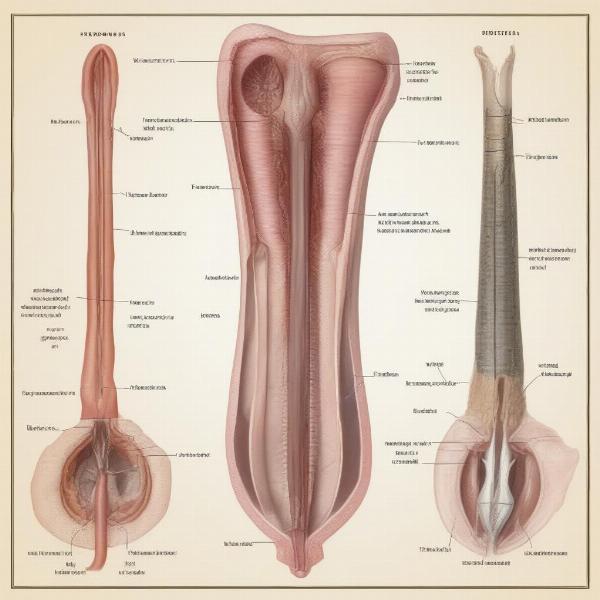Prolapsed urethra in dogs is a serious condition where the inner lining of the urethra protrudes from the urethral opening, appearing as a small, pink or red mass. This article will cover the causes, symptoms, diagnosis, and treatment options for this condition, equipping you with the knowledge to recognize and address this potentially painful and dangerous issue.
Understanding Prolapsed Urethra in Dogs
A prolapsed urethra can occur in both male and female dogs, although it is more common in males. The urethra is the tube that carries urine from the bladder to the outside of the body. A prolapse means that a portion of the inner lining of this tube has turned outward, becoming visible. This can cause discomfort, bleeding, and difficulty urinating.
 Diagram of Prolapsed Urethra in a Dog
Diagram of Prolapsed Urethra in a Dog
Causes of Urethral Prolapse in Dogs
Several factors can contribute to a urethral prolapse. Hormonal imbalances, particularly excessive estrogen, can weaken the urethral tissues, making them more prone to prolapse. Straining during urination due to bladder stones or urinary tract infections can also play a role. In some cases, trauma to the area may be a contributing factor. Certain breeds, such as English Bulldogs and Boston Terriers, appear to be predisposed to the condition.
Recognizing the Symptoms of a Prolapsed Urethra
Identifying a prolapsed urethra is usually straightforward. The most obvious sign is a small, pink or reddish mass protruding from the urethral opening. You might also notice your dog licking the area excessively, showing signs of discomfort when urinating, or having blood in their urine. If you suspect your dog has a prolapsed urethra, prolapsed urethra in dogs provides further information.
Diagnosis and Treatment Options for Prolapsed Urethra
If you notice any symptoms suggestive of a prolapsed urethra, it’s crucial to seek veterinary attention immediately. The veterinarian will perform a physical examination to confirm the diagnosis. Treatment options vary depending on the severity of the prolapse. In mild cases, topical medications may be sufficient to reduce inflammation and allow the urethra to retract. In more severe cases, surgical intervention may be necessary to correct the prolapse and prevent recurrence. Sometimes, if the dog is not urinating after surgery, you should consult your vet. For further information on this topic, you can read our article on dog not urinating after surgery.
Preventing Urethral Prolapse in Dogs
While not all cases of urethral prolapse are preventable, certain measures can help reduce the risk. Ensuring your dog has access to plenty of fresh water can help prevent urinary tract infections and reduce straining during urination. Prompt treatment of bladder stones and other urinary tract issues is also crucial. For male dogs, neutering can minimize the influence of hormones and decrease the likelihood of prolapse.
Conclusion
Prolapsed urethra in dogs is a condition that requires prompt veterinary attention. Early diagnosis and treatment can significantly improve the prognosis and prevent complications. By being aware of the causes, symptoms, and treatment options, you can be better prepared to protect your furry friend’s health and well-being.
FAQ
- What does a prolapsed urethra in a dog look like? It appears as a small, pink or red mass protruding from the urethral opening.
- Is urethral prolapse painful for dogs? Yes, it can be painful and cause discomfort when urinating.
- Can a prolapsed urethra heal on its own? In some mild cases, it might, but veterinary attention is always recommended.
- What is the surgery for a prolapsed urethra like? The surgery involves correcting the prolapsed tissue and sometimes removing a small portion of the affected urethra.
- How can I prevent my dog from getting a prolapsed urethra? Ensuring adequate hydration, prompt treatment of urinary issues, and neutering male dogs can help reduce the risk.
- Is a prolapsed urethra an emergency? While not always a life-threatening emergency, it requires prompt veterinary care to prevent complications.
- What are the long-term effects of a prolapsed urethra? Untreated, it can lead to urinary obstruction, infection, and other health problems.
About ILM Dog
ILM Dog is your trusted global resource for expert advice on dog care and wellbeing. We provide practical and reliable information on a wide range of topics, including breed selection, health and medical care, training, nutrition, grooming, and accessories. Our goal is to empower dog owners worldwide with the knowledge and resources they need to provide the best possible care for their canine companions. Whether you’re a new dog owner or an experienced one, ILM Dog is here to support you every step of the way. Contact us today at [email protected] or +44 20-3965-8624 for personalized advice and support.